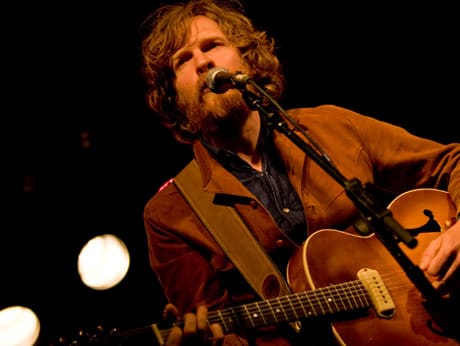The critical acclaim generated abroad for Doug Paisley's '08 self-titled debut album says much about the insularity of the Canadian roots music establishment. Although the Toronto, ON-based Paisley had already paid his dues over the previous decade playing in a Stanley Brothers tribute act, and as part of project with visual artist Shary Boyle, his first record's timeless grace, which most often drew comparisons to the Band and James Taylor, was virtually ignored at home. Constant Companion, by all rights, should not be, since at its core it proves Paisley's staying power. The album's nine tracks don't strain to be anything more than what they are: understated, autumnal echoes of classic country heartbreak. These emotions are particularly intense on the handful of duets with vocalists Julie Faught and Jennifer Castle, and fans of the Band will appreciate keyboardist Garth Hudson's exceptional contributions throughout. But none of that overshadows Paisley's deeply soulful performances. His subtle, pure Appalachian, high lonesome twang ― at times reminiscent of My Morning Jacket's Jim James ― is an all-too-uncommon sound heard within Canada. At the same time, Paisley's way with penning universal themes of love and loss is equally effortless. Constant Companion is a true gem waiting to be discovered.
You seem to be following the old Canadian pattern of getting recognition abroad before getting it at home.
If that's so then I'm definitely in the first stage of that process. Certain parts of a fledgling career are more viable in the States. It's not a nationalist thing for me ― even Canadian geese have to migrate. I'm touring Canada this November and December, and I'm very excited about that.
Were there any different themes that you wanted to explore on Constant Companion than on your previous album?
Making a second album inevitably comes with its own set of conundrums. Surgically extracting what worked before from what will sound redundant or overly about-face is impossible. I ended up deliberating on that for so long that something just came up in the meantime.
Do you feel that to be a successful songwriter someone has to go through a musical apprenticeship, as you did?
When I feel that I've become a successful songwriter maybe I'll know the answer to that. But I don't know how you could be a songwriter without being foremost a listener. Garth Hudson, for all he has done, he's remained infinitely curious about music. Recording with him was instructive and inspiring.
(No Quarter)You seem to be following the old Canadian pattern of getting recognition abroad before getting it at home.
If that's so then I'm definitely in the first stage of that process. Certain parts of a fledgling career are more viable in the States. It's not a nationalist thing for me ― even Canadian geese have to migrate. I'm touring Canada this November and December, and I'm very excited about that.
Were there any different themes that you wanted to explore on Constant Companion than on your previous album?
Making a second album inevitably comes with its own set of conundrums. Surgically extracting what worked before from what will sound redundant or overly about-face is impossible. I ended up deliberating on that for so long that something just came up in the meantime.
Do you feel that to be a successful songwriter someone has to go through a musical apprenticeship, as you did?
When I feel that I've become a successful songwriter maybe I'll know the answer to that. But I don't know how you could be a songwriter without being foremost a listener. Garth Hudson, for all he has done, he's remained infinitely curious about music. Recording with him was instructive and inspiring.
